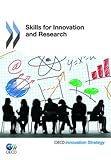Skills for innovation and research /
Material type: TextLanguage: English Series: OECD innovation strategyPublication details: Paris: OECD, 2011Description: 142 p.: ill.; 23 cmISBN:
TextLanguage: English Series: OECD innovation strategyPublication details: Paris: OECD, 2011Description: 142 p.: ill.; 23 cmISBN: - 9789264097476
- 2011
| Item type | Current library | Home library | Collection | Shelving location | Call number | Copy number | Status | Date due | Barcode |
|---|---|---|---|---|---|---|---|---|---|
 Libro
Libro
|
Biblioteca Juan Bosch | Biblioteca Juan Bosch | Oficina Leonel Fernández | Colección 6to. Piso | 2011 (Browse shelf(Opens below)) | 1 | Available | 00000102949 |
Browsing Biblioteca Juan Bosch shelves, Shelving location: Colección 6to. Piso, Collection: Oficina Leonel Fernández Close shelf browser (Hides shelf browser)
Written by Sarah Box and Ester Basri for the OECD Directorate for Science, Technology, and Industry's Working Party on Research Institutions and Human Resources (RIHR). "92 2011 01 1 P".--Back cover.
Innovation holds the key to ongoing improvements in living standards, as well as to solving pressing social challenges. Skilled people play a crucial role in innovation through the new knowledge they generate, how they adopt and develop existing ideas, and through their ability to learn new competencies and adapt to a changing environment. This book seeks to increase understanding of the links between skills and innovation. It explores the wide range of skills required, ranging from technical to "soft", and the ability to learn; it presents data and evidence on countries' stocks and flows of skills and the links between skill inputs and innovation outputs. Given the importance of meeting the demands of knowledge-based economic activity, the book investigates the issues of skill supply, education, workplace training and work organisation. It highlights the importance of enabling individuals to acquire appropriate skills and of optimising these at work.









There are no comments on this title.